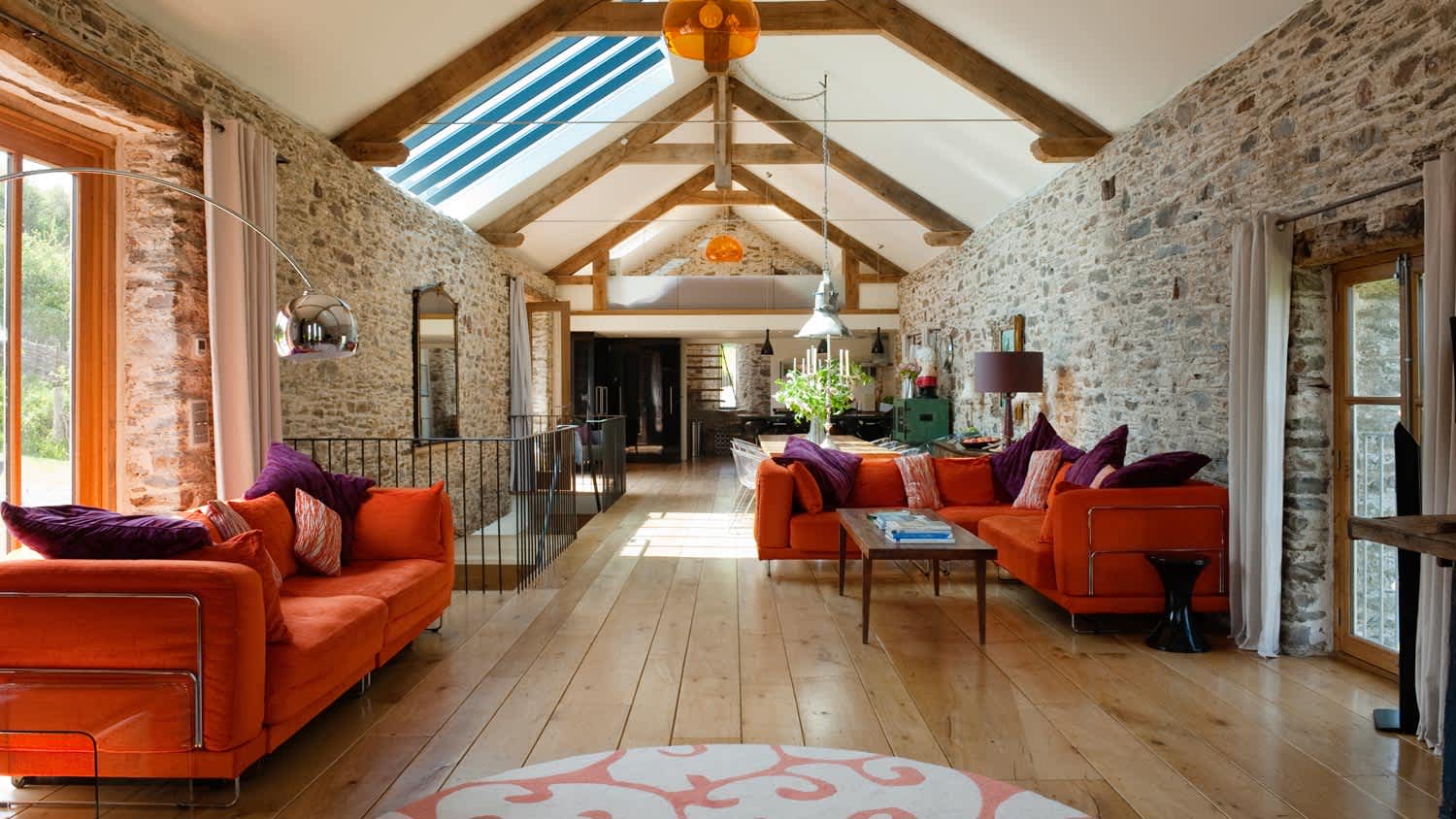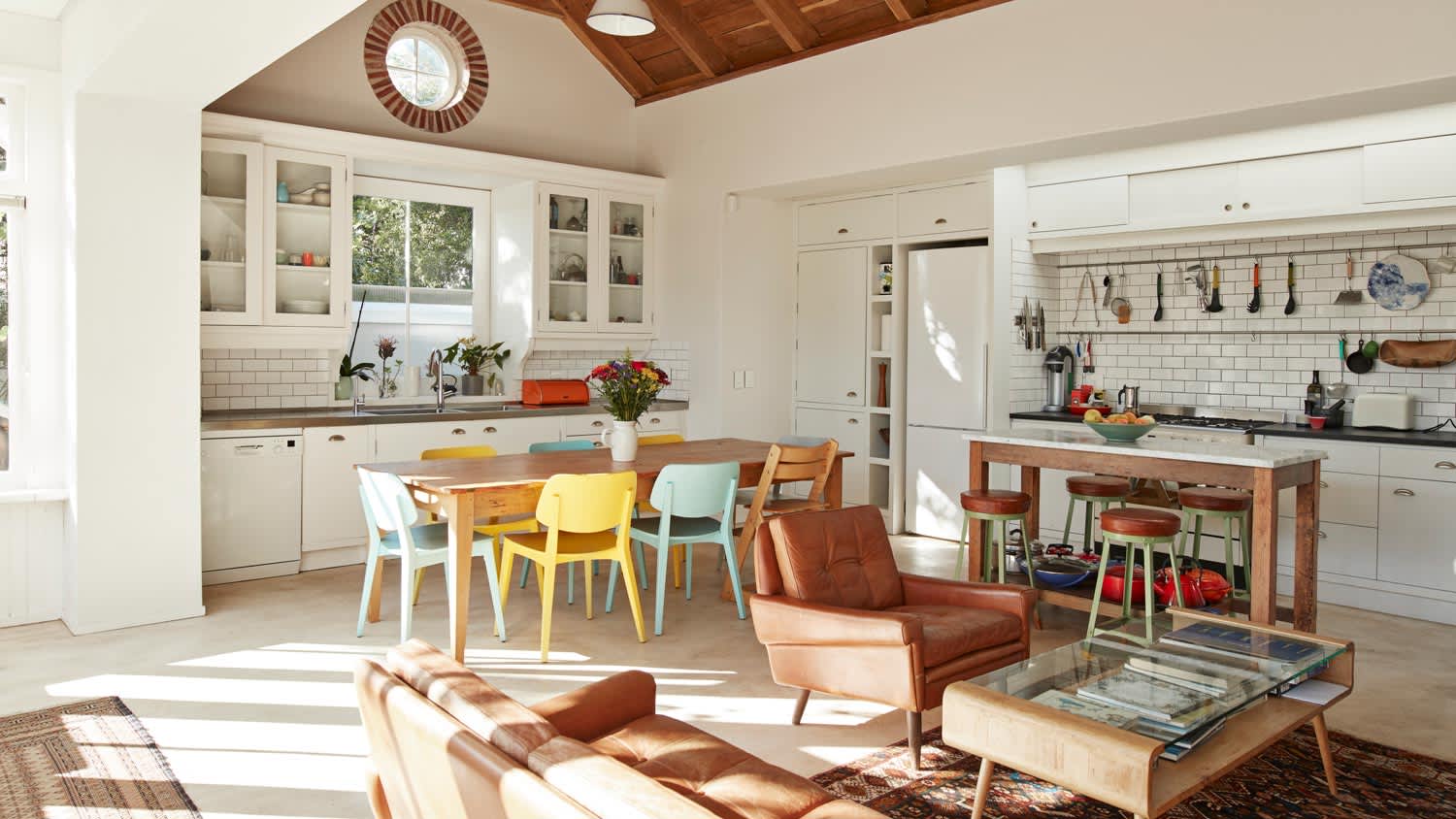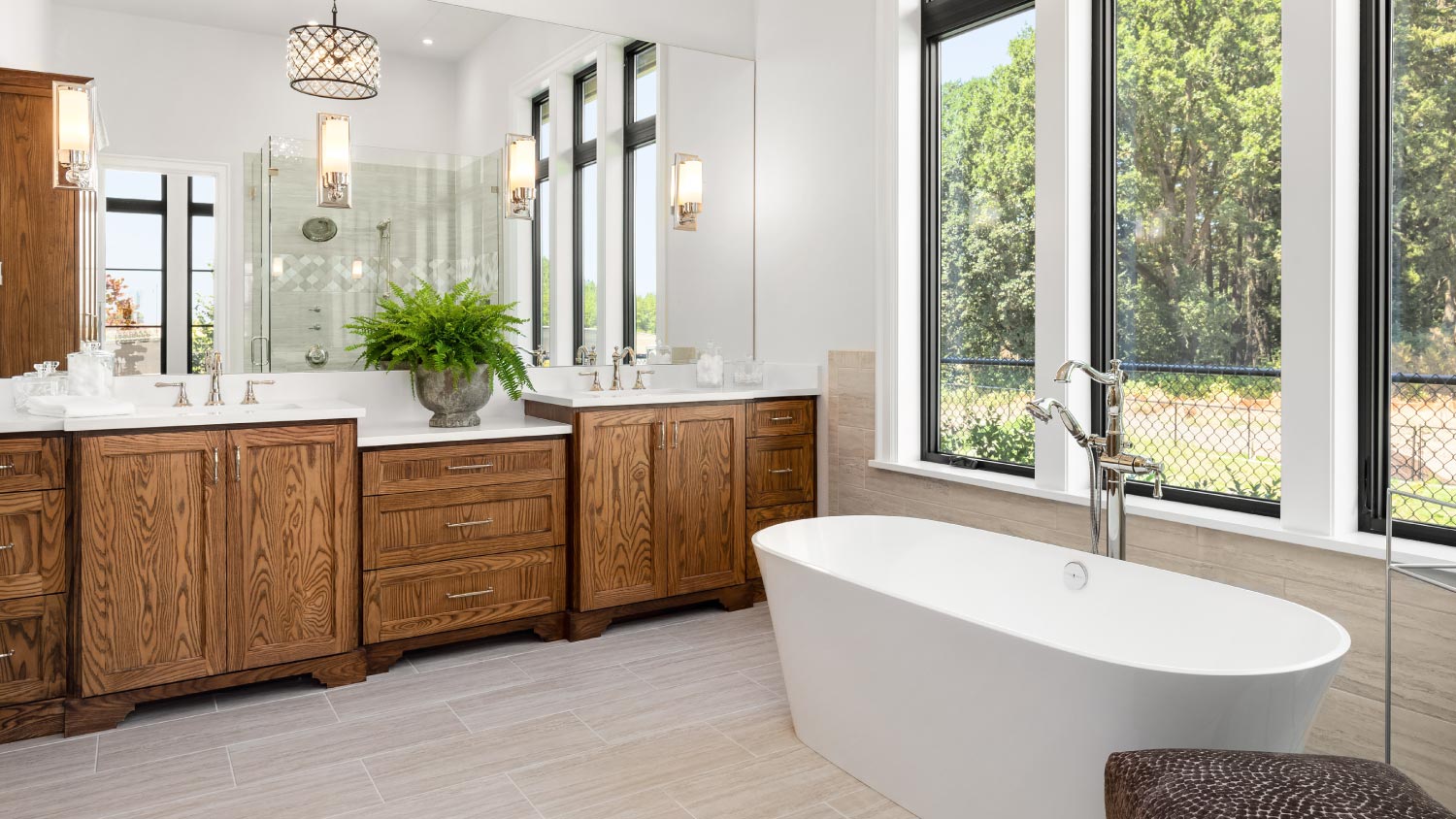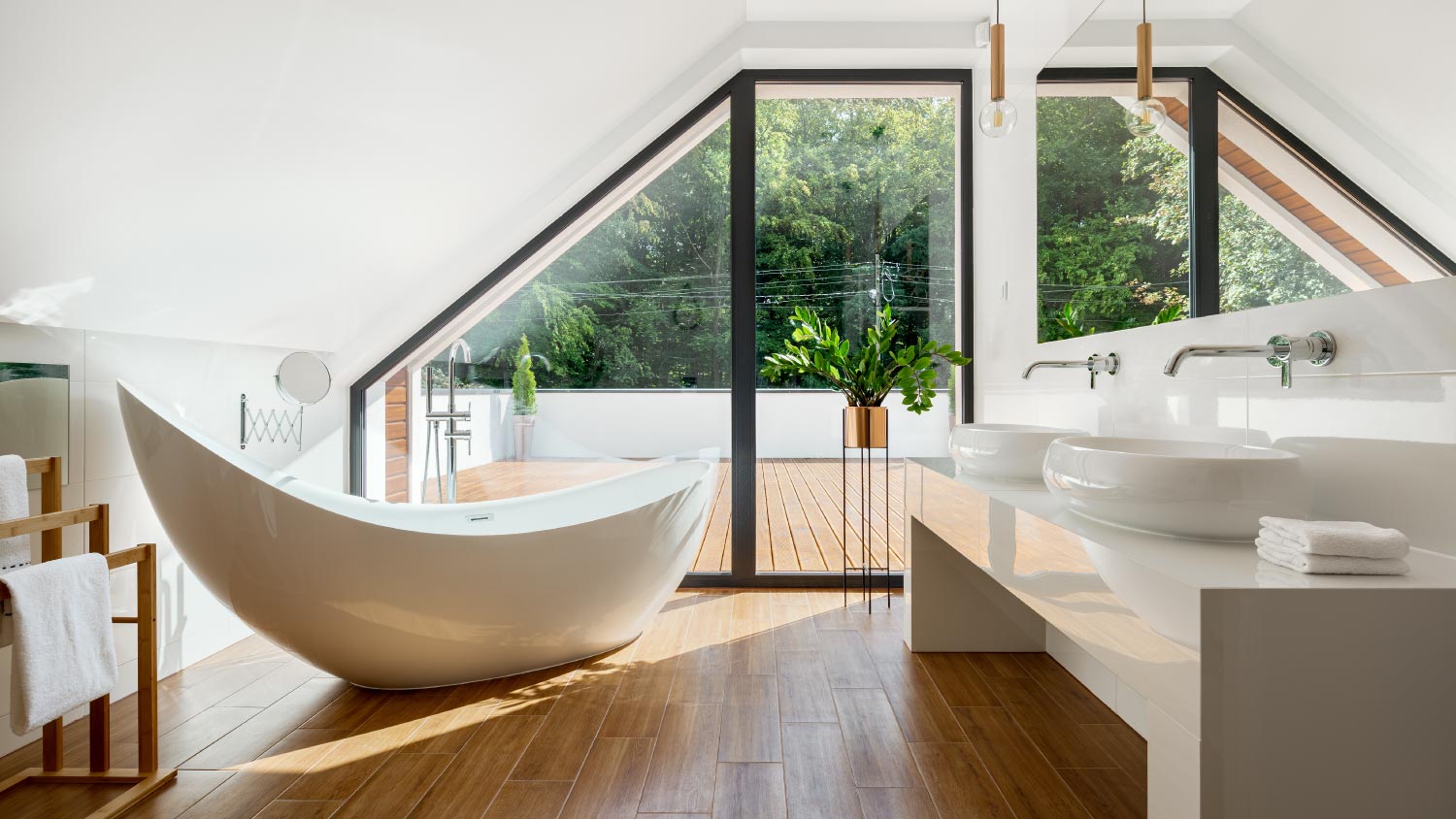
If your bathroom needs sprucing up, a new vanity will make a big difference. Vanity installation costs depend on the size and type of the countertops and fixtures you choose.
The average cost to renovate a house ranges between $19,477 and $88,369, with an average of $52,217. Renovation costs depend on the type and extent of the renovations, labor costs, and more.


Renovating a house often costs between $15 and $60 per square foot—though high-end renovations might cost $150 per square foot.
If you’re renovating a 1,250 to 1,600 square foot home, expect to spend anywhere from $3,000 to $190,000, with an average cost of $52,217.
Home renovations offer a return on investment (ROI) of around 60% or more.
Labor accounts for 50% to 60% of the total cost, and you’ll need to hire multiple pros like a general contractor, plumber, and electrician.
If your home needs updating or you’ve just purchased the ideal fixer-upper, refreshing it with a home renovation can turn a house that’s just OK into the home of your dreams. Renovating a 1,250 to 1,600 square foot home costs an average of $52,217, although you may pay as little as $3,000 if it only needs a little work or as much as $190,000 for a complete renovation. Planning a renovation budget involves factoring in a lot of cost details, which we’ll explore in this guide
House renovation costs about $15 to $60 per square foot on average, but that range can get even wider depending on the quality of the materials you use. If you want custom paints, high-end flooring, or other premium finishes, you might end up spending upwards of $150 per square foot.
Even with standard finishes, though, the square footage of your home will be a major player in determining renovation cost. Here’s a breakdown of whole house renovation costs per square foot:
| House Square Feet | Average Cost Range |
|---|---|
| 1,250 | $18,750–$75,000 |
| 1,600 | $24,000–$96,000 |
| 2,000 | $30,00–$120,000 |
| 2,500 | $37,500–$150,000 |
| 3,500 | $52,500–$210,000 |
When renovating a house, you may decide to overhaul all the rooms at once or take it one room at a time. Keep in mind that rooms that require running water cost more to renovate than “dry” rooms. Here are some common costs to expect for each room, with prices ranging from $1,500 to more than $50,000 per room:
| Renovation Project | Average Cost |
|---|---|
| Living room remodel | $5,000–$10,000 |
| Bedroom remodel | $1,500–$5,500 |
| Kitchen renovation | $14,500–$40,500 |
| Bathroom remodel | $6,500–$28,000 |
| Basement renovation | $12,000–$35,000 |
| Home theater installation | $10,000–$60,000 |
| Attic remodel | $4,500–$16,500 |
| Garage renovation | $1,500–$50,000 |
Most homeowners choose to hire a general contractor instead of several tradespeople and subcontractors themselves. Hiring a general contractor will cost between 40% and 50% of the overall cost of the renovations. However, it will free up your time and eliminate the potential frustrations of doing the work yourself and managing the various tradespeople involved.
A general contractor will handle all aspects of the job, from planning and designing to completion and inspections. A contractor's job includes hiring the right subcontractors for the work or supplying the labor, managing the subs and the schedule, pulling permits, handling the inspections, and everything in between.
However, here is a look at some of the specialists that your local remodeling pro may bring on to help with your project.
Whether you choose to hire a general contractor, a construction manager, or manage the work yourself, be sure to have the proper insurance coverage. At the minimum, make sure that the entity managing the construction has builder’s risk insurance, general liability insurance and, for every employee, workers’ compensation insurance.
Installing or replacing plumbing costs $350 to $2,000 on average. If you need to make a few updates to a room or fix some leaky pipes, plumbing repairs cost about $330. However, you’ll need to budget for labor costs, about $180 to $500 per hour for the cost to hire a plumber. More extensive plumbing work—including roughing in the plumbing in a new home addition—will push you toward or above the $2,000 mark. Some other projects a plumber might tackle during a home renovation include:
Rerouting plumbing: $700–$1,500
Adding a shower: $1,100–$8,500
Replacing faucets or fixtures: $$150–$600
Rewiring a house costs $1,500 for a small rewiring project to $10,000 or more to rewire the entire house. Installing new outlets costs about $75 to $490 per outlet, while upgrading an electrical panel costs about $1,250. No matter what type of electrical work you need, you can expect electricians to charge about $50 to $100 per hour.
Once again, more extensive renovations, like gut renovations or installing a dormer or home addition, will drive up the price for electrical work. Some renovation tasks you’ll need an electrician for include:
Installing a ceiling fan: $140–$350
Adding a light switch: $60–$300
Installing a new breaker box: $500–$1,800
Depending on the scope of your renovations, you may need to bring in some additional pros to complete the project.
HVAC contractor: $5,000 to $12,500 for a new HVAC system
Drywall installer: $1.50–$3 per sq. ft.
Flooring installer: $3–$15 per sq. ft.
Window installer: $300–$1,500 per window
Your home's physical location can affect the cost of renovations. Fluctuations in regional and local labor and prices have a large impact because of the labor-heavy nature of home improvement projects. Labor charges in metropolitan areas tend to be higher than in rural locations. Regional material price can also have an effect, but typically to a lesser extent than labor.
The table below includes some average home renovation prices in major cities across the U.S.
| City | Average Home Renovation Cost |
|---|---|
| Austin | $39,400 |
| Chicago | $44,700 |
| Dallas | $42,000 |
| Houston | $45,400 |
| Los Angeles | $47,200 |
| New York | $50,100 |
| Philadelphia | $40,000 |
| Phoenix | $39,500 |
| San Antonio | $35,900 |
| San Francisco | $56,500 |
| Seattle | $52,600 |
Several other costs can come into play in addition to the primary cost factors of home renovation. The cost of these factors and whether you'll need to include them in your planning will depend on the scope and specifics of your project.
Older home renovations start around $100,000 and can increase from there. These renovations are usually more expensive than renovating a newer home since you’ll likely need to update plumbing, electrical, and HVAC systems. Plus, older homes may reveal hidden problems during the renovation process, such as termite damage costs or water damage in the basement.
Building permits cost about $500 to $2,500 for major home renovations. Small updates, like painting a room, don’t often require permits. Check your local rules and regulations or ask your contractor if you need a permit to renovate your house.
The timeline for a home renovation is two to eight months, on average. For minor or “contained” renovations, like redoing one of several bathrooms or a single bedroom, you and your family can live in your home while your contractors work. For larger projects, like gut renovations or second-story dormers, you’ll need to pay for alternative living space, like a mobile home on your property or an extended-stay hotel. These can cost anywhere from $2,000 to $10,000 or more, depending on how long you need the arrangements.
Changing the floor plan of a room or area may cost about $350 to $500 for minor changes or over $10,000 for major changes. These changes may involve knocking down or building new walls or rerouting the electrical work or plumbing, so you’ll need to hire a structural engineer and other certified professionals to ensure the changes are safe to implement.
Major floor plan changes—like removing a load-bearing wall and installing a steel I-beam in its place—will fetch the highest prices when it comes to floor plan alteration.
When drafting your home design, think about the function of each room and the flow of your home as a whole. Thoughtful planning at this stage will help you create an effective and comfortable space that your household can enjoy for years to come.
While you’re installing new kitchen cabinets or a custom laundry storage system, you may be considering upgrades to the fridge or washer and dryer. New appliances may cost $200 to $10,000 each, depending on the appliance type and quality. For example, Energy Star-rated appliances typically cost $200 to $3,500, and custom built-in appliances will likely cost $1,000 to $10,000.
Mold remediation costs $2,230 on average, and asbestos removal costs about $1,200 to $3,100, depending on the extent of the damage. Mold and asbestos remediation need professional attention, or these problems can put your family’s health at risk. If you discover either of these issues during a DIY renovation, stop the process and bring in a professional to address it immediately.
Keep in mind that you might need alternative housing during the renovation if mold or asbestos could become airborne during the process, and potentially put your family at risk. As such, these issues can contribute to higher costs overall.
Foundation repairs cost between $2,200 and $7,700 in most cases and might be essential to keeping the home structurally sound and safe. Again, you will likely need to work with a structural engineer to ensure the foundation is repaired and maintained properly. You’ll likely need to repair the foundation before you can get started on any other renovations.
Designing a home with accessibility in mind can be challenging and may increase renovation costs. We highly recommend consulting with any individual with specific accessibility needs to determine whether features like a home elevator, stair lift, or other universal design accommodations are desired. Be sure to communicate these needs clearly with the pro to ensure satisfactory results after the remodel.

If you hire a home renovation company near you for the job, you can expect to pay 20% to 40% of the total project cost for labor. Most renovation projects will require hiring professionals for tasks such as electrical, plumbing, and other specialized work.
Home renovations can be a huge undertaking, so here are the reasons you should hire a pro:
Professionals will obtain the necessary permits to comply with local building regulations.
The pros have the skills to complete the job safely and efficiently.
DIY mistakes can cause severe property damage and lead to costly repairs.
They have access to high-quality materials and connections to reliable suppliers, which will give you a wider range of options.
Most home renovation pros warranty their work, so you will save costs and have peace of mind if something goes wrong.
We don’t recommend tackling extensive home renovations yourself due to the potential risk of injuries and problems that can arise. However, if you are a handy DIYer, you can focus on these types of tasks to save time and labor costs.
Clear and prepare the work area.
Cover furniture, appliances, air ducts, and any other items that require protection from dust and debris.
Make living arrangements if the project is in areas that you need for day-to-day living, such as the bathroom or kitchen.
If you have experience, you can perform light demo tasks yourself, such as removing non-structural items and old carpeting, to save on labor costs.
Performing simple tasks such as caulking, filling in holes, and painting can help reduce the amount you will pay a pro.
The primary difference between renovating your home and fully remodeling it comes down to cost and project scope. Remodeling generally includes making structural or floor-plan changes, adding rooms, or significant tear-outs and rebuilding. Renovations, on the other hand, can be as simple as replacing furniture, adding window treatments, painting, updating appliances, or adding storage or shelving.
While remodeling can completely change your home's look, feel, and functionality, the project will cost significantly more than renovating the space or a room at a time. If you're looking to meet a budget and remodeling is threatening to max it out, consider performing renovations instead. Doing so can refresh your home's look, including DIY tasks like painting, making repairs, and updating fixtures and components to provide a fresh feel to any space.
Renovating a house costs a lot of money upfront, but there are ways to save while achieving the home of your dreams.
Budget-Friendly Materials: Mid-range options are more durable and last longer than the least expensive materials on the market while offering a similar look at a lower cost than high-end alternatives.
Do Safe DIY: You can’t complete an entire home renovation on your own, but you can take on some smaller, easier tasks to save money on labor costs. Many homeowners can handle painting rooms, tearing out old carpets, or installing shelves themselves to save on individual project costs.
Consider Short- and Long-Term Savings: While you may be tempted to buy the least expensive flooring option or windows on the market, keep in mind that you often get what you pay for. While you could save upfront on low-cost materials, you may spend more on maintaining, repairing, or replacing these materials down the road.
Maximize Space: House renovation costs heavily depend on the size of the house or each room, so you can save by sticking to smaller square footage while making the most of the existing space.
Multiple Quotes: Before signing any home renovation contracts, get at least three quotes for each professional service you plan to hire. Compare what each price includes to get the best value for each part of the renovation process.
Completely remodeling your house will include elements that can have an excellent return on your investment (ROI), while other parts of the job may not significantly increase the home's value. Home improvement or remodeling projects with excellent ROIs can fetch between 60% and more than 100% of your investment in terms of house value increases.
Kitchen remodels, upgrading to energy-efficient windows and doors, installing efficient appliances, adding attic or basement living space, adding a deck, and upgrading the exterior finishes can all earn excellent ROIs.
Luxury installations, such as high-end fixtures and finishes, generally do worse when it comes to ROI, as does installing sub-par materials such as wall-to-wall carpeting throughout the home or using outdated laminate countertops. Depending on your location, installing a pool can realize moderate returns or none at all, and can even reduce the home's selling appeal.
Always verify the renovation pro’s credentials, as well as whether they are licensed, bonded, and insured.
Be prepared to discuss with the pro their recommendations for the best materials to use based on your design choices, home size, and budget.
Consult your renovation pro about the projected timeline for completing the renovations so you can plan accordingly.
Home is the most important place on earth, which is why Angi has helped more than 150 million homeowners transform their houses into homes they adore. To help homeowners with their next project, Angi provides readers with the most accurate cost data and upholds strict editorial standards. We’ve surveyed over 10,000 real Angi customers about their project costs to develop the pricing data you see, so you can make the best decisions for you and your home. We pair this data with research from reputable sources, including the U.S. Bureau of Labor Statistics, academic journals, market studies, and interviews with industry experts—all to ensure our prices reflect real-world projects.
Want to help us improve our cost data? Send us a recent project quote to [email protected]. Quotes and personal information will not be shared publicly.
From average costs to expert advice, get all the answers you need to get your job done.

If your bathroom needs sprucing up, a new vanity will make a big difference. Vanity installation costs depend on the size and type of the countertops and fixtures you choose.

If your basement ceiling is low, there are ways to raise it. Learn more about the cost to raise a basement ceiling to be able to enjoy your basement and create a more usable space in your home.

Building a guest house is one of the largest home projects and involves several different professionals. Learn about the cost to build a guest house and where you can save.

An updated bathtub can give a bathroom a whole new look. Find out how much it costs to replace a bathtub in Tampa, FL, including prices by type and labor costs.

An updated bathtub can give a bathroom a whole new look. Find out how much it costs to replace a bathtub in Orlando, FL, including prices by type and labor costs.

An updated bathtub can give a bathroom a whole new look. Find out how much it costs to replace a bathtub in Columbus, OH, including prices by type and labor costs.